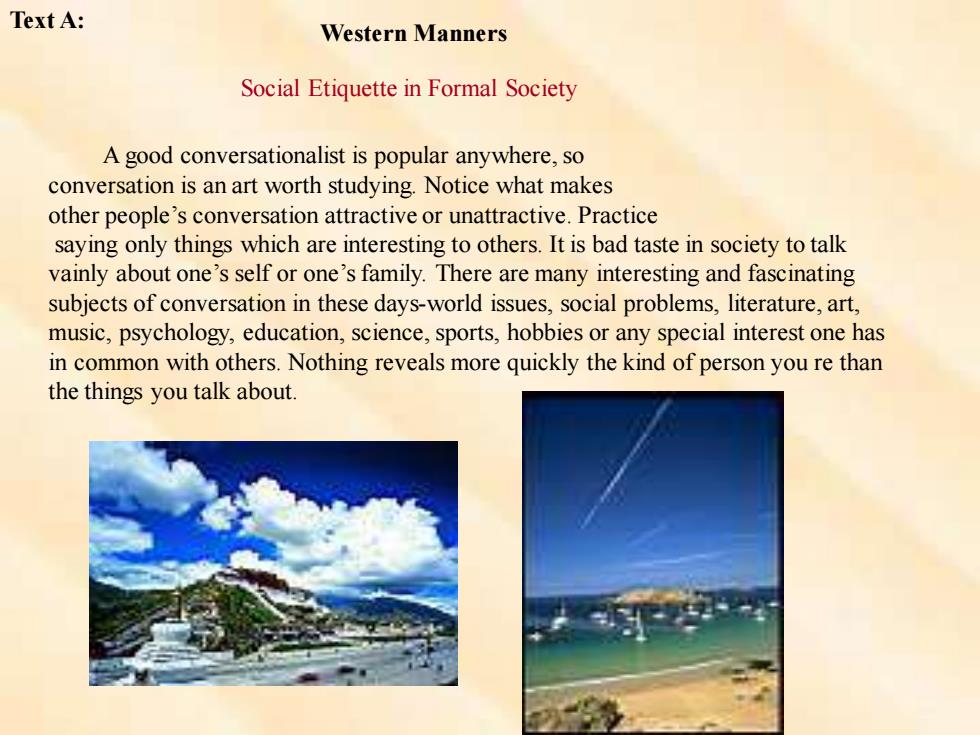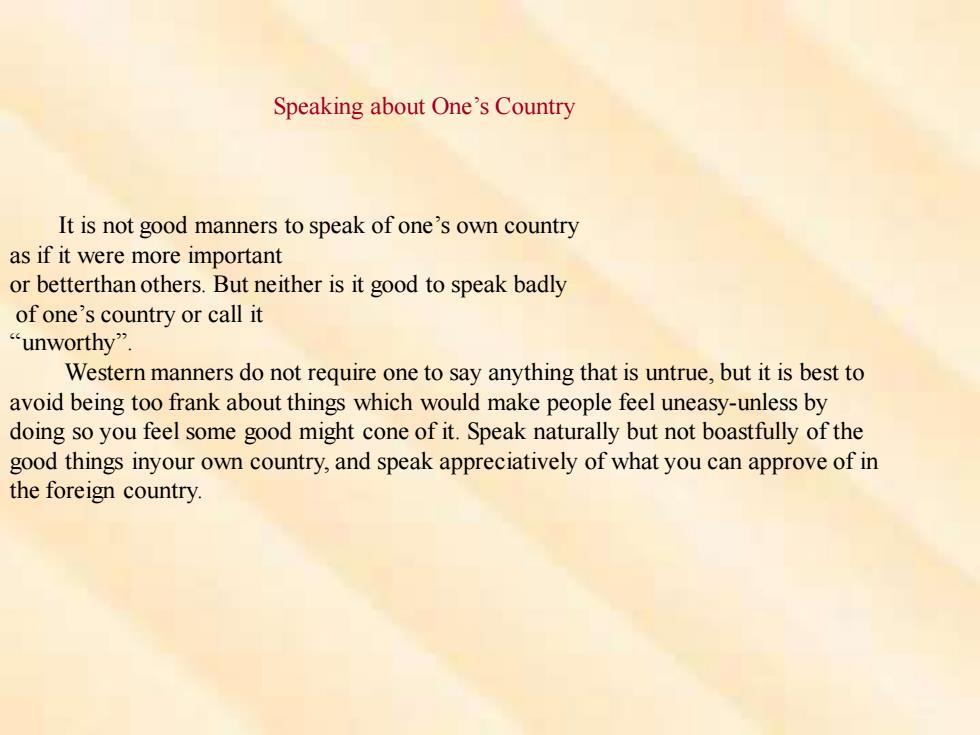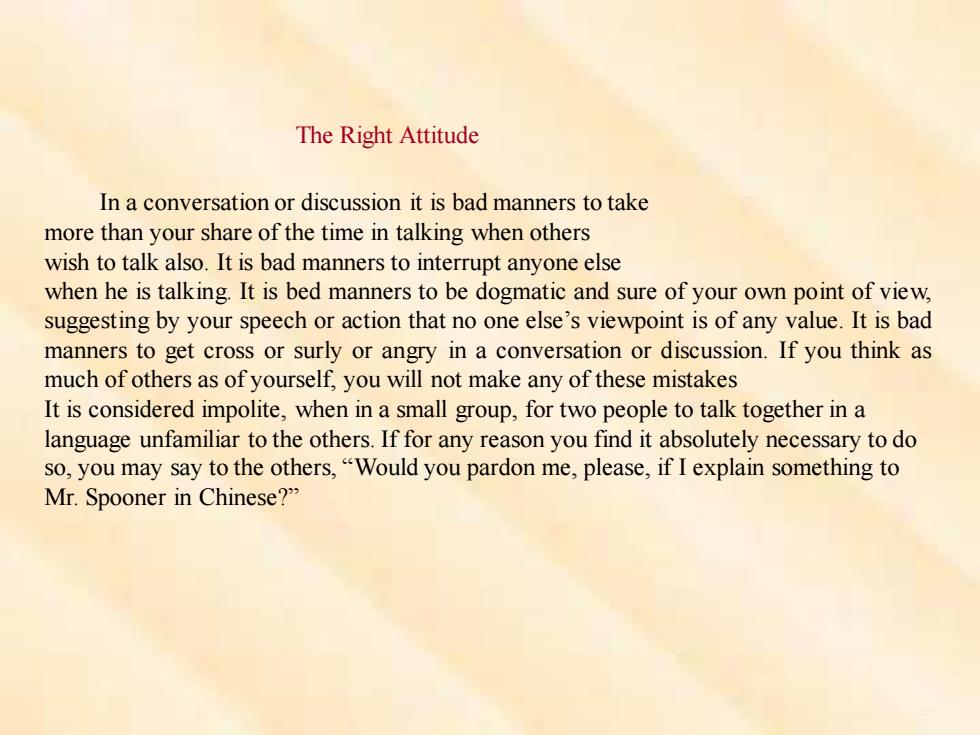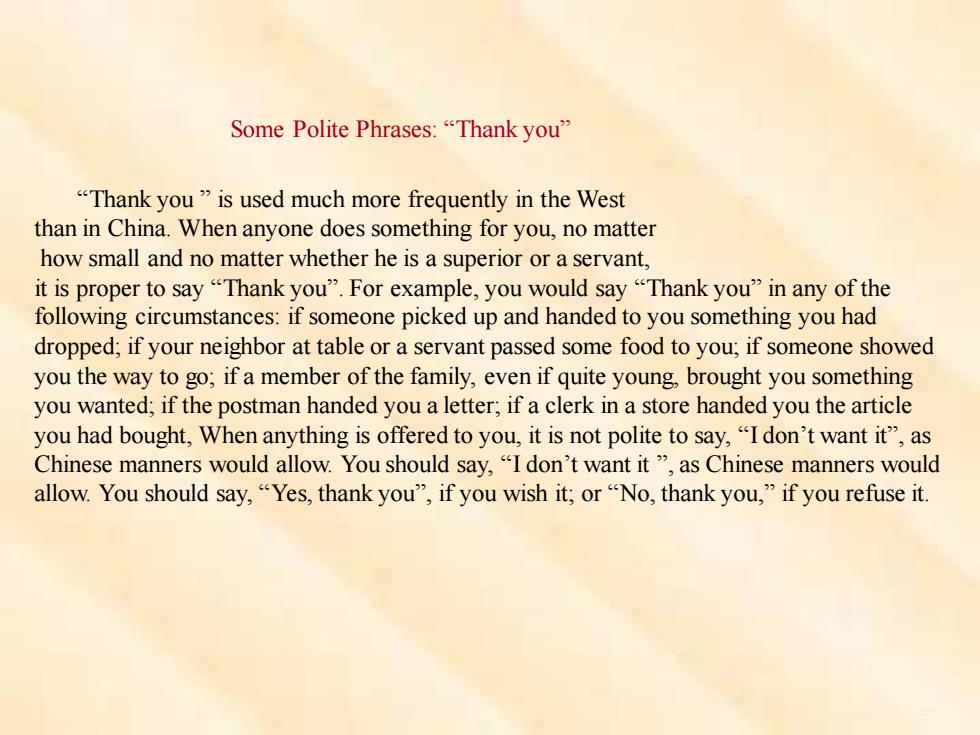
Text A: Western Manners Social Etiquette in Formal Society A good conversationalist is popular anywhere,so conversation is an art worth studying.Notice what makes other people's conversation attractive or unattractive.Practice saying only things which are interesting to others.It is bad taste in society to talk vainly about one's self or one's family.There are many interesting and fascinating subjects of conversation in these days-world issues,social problems,literature,art, music,psychology,education,science,sports,hobbies or any special interest one has in common with others.Nothing reveals more quickly the kind of person you re than the things you talk about
Text A: Western Manners Social Etiquette in Formal Society A good conversationalist is popular anywhere, so conversation is an art worth studying. Notice what makes other people’s conversation attractive or unattractive. Practice saying only things which are interesting to others. It is bad taste in society to talk vainly about one’s self or one’s family. There are many interesting and fascinating subjects of conversation in these days-world issues, social problems, literature, art, music, psychology, education, science, sports, hobbies or any special interest one has in common with others. Nothing reveals more quickly the kind of person you re than the things you talk about

Subjects to Avoid There are certain things which it is considered bad manners in Western countries to talk about in society.It is very important to know these and avoid them.The subjects to be avoided are:bodily functions,or anything connected with the more private parts of the body,details of birth,details of unpleasant illnesses; income or salary of friends,or prices of their possessions;the age of the person one is talking with;personal questions or remarks,such as,"Why don't you get married?"or"I should think you would want to have some children."Some of these are allowed in Chinese society,but they are all taboo in formal Western society
Subjects to Avoid There are certain things which it is considered bad manners in Western countries to talk about in society. It is very important to know these and avoid them. The subjects to be avoided are: bodily functions, or anything connected with the more private parts of the body, details of birth, details of unpleasant illnesses; income or salary of friends, or prices of their possessions; the age of the person one is talking with; personal questions or remarks, such as, “Why don’t you get married?” or “I should think you would want to have some children.” Some of these are allowed in Chinese society, but they are all taboo in formal Western society

Speaking about One's Country It is not good manners to speak of one's own country as if it were more important or betterthan others.But neither is it good to speak badly of one's country or call it “unworthy”. Western manners do not require one to say anything that is untrue,but it is best to avoid being too frank about things which would make people feel uneasy-unless by doing so you feel some good might cone of it.Speak naturally but not boastfully of the good things inyour own country,and speak appreciatively of what you can approve of in the foreign country
Speaking about One’s Country It is not good manners to speak of one’s own country as if it were more important or betterthan others. But neither is it good to speak badly of one’s country or call it “unworthy”. Western manners do not require one to say anything that is untrue, but it is best to avoid being too frank about things which would make people feel uneasy-unless by doing so you feel some good might cone of it. Speak naturally but not boastfully of the good things inyour own country, and speak appreciatively of what you can approve of in the foreign country

The Right Attitude In a conversation or discussion it is bad manners to take more than your share of the time in talking when others wish to talk also.It is bad manners to interrupt anyone else when he is talking.It is bed manners to be dogmatic and sure of your own point of view, suggesting by your speech or action that no one else's viewpoint is of any value.It is bad manners to get cross or surly or angry in a conversation or discussion.If you think as much of others as of yourself,you will not make any of these mistakes It is considered impolite,when in a small group,for two people to talk together in a language unfamiliar to the others.If for any reason you find it absolutely necessary to do so,you may say to the others,"Would you pardon me,please,if I explain something to Mr.Spooner in Chinese?
The Right Attitude In a conversation or discussion it is bad manners to take more than your share of the time in talking when others wish to talk also. It is bad manners to interrupt anyone else when he is talking. It is bed manners to be dogmatic and sure of your own point of view, suggesting by your speech or action that no one else’s viewpoint is of any value. It is bad manners to get cross or surly or angry in a conversation or discussion. If you think as much of others as of yourself, you will not make any of these mistakes It is considered impolite, when in a small group, for two people to talk together in a language unfamiliar to the others. If for any reason you find it absolutely necessary to do so, you may say to the others, “Would you pardon me, please, if I explain something to Mr. Spooner in Chinese?

Some Polite Phrases:"Thank you" "Thank you"is used much more frequently in the West than in China.When anyone does something for you,no matter how small and no matter whether he is a superior or a servant, it is proper to say "Thank you".For example,you would say"Thank you"in any of the following circumstances:if someone picked up and handed to you something you had dropped;if your neighbor at table or a servant passed some food to you;if someone showed you the way to go;if a member of the family,even if quite young,brought you something you wanted;if the postman handed you a letter;if a clerk in a store handed you the article you had bought,When anything is offered to you,it is not polite to say,"I don't want it",as Chinese manners would allow.You should say,"I don't want it",as Chinese manners would allow.You should say,"Yes,thank you",if you wish it;or"No,thank you,"if you refuse it
Some Polite Phrases: “Thank you” “Thank you ” is used much more frequently in the West than in China. When anyone does something for you, no matter how small and no matter whether he is a superior or a servant, it is proper to say “Thank you”. For example, you would say “Thank you” in any of the following circumstances: if someone picked up and handed to you something you had dropped; if your neighbor at table or a servant passed some food to you; if someone showed you the way to go; if a member of the family, even if quite young, brought you something you wanted; if the postman handed you a letter; if a clerk in a store handed you the article you had bought, When anything is offered to you, it is not polite to say, “I don’t want it”, as Chinese manners would allow. You should say, “I don’t want it ”, as Chinese manners would allow. You should say, “Yes, thank you”, if you wish it; or “No, thank you,” if you refuse it